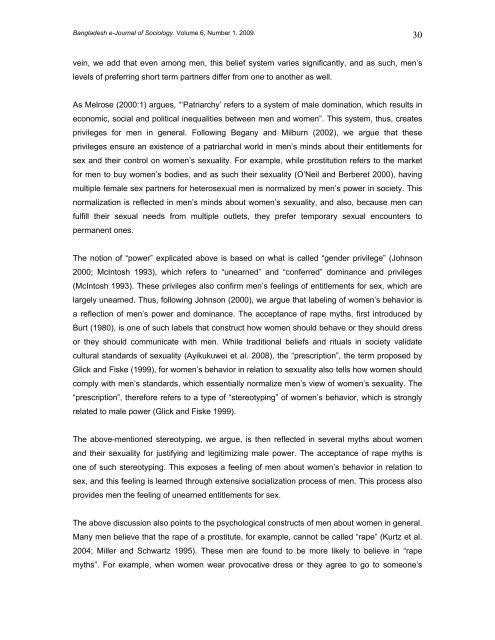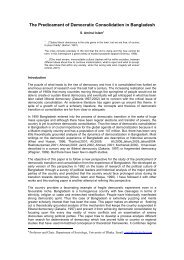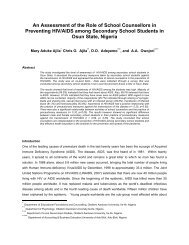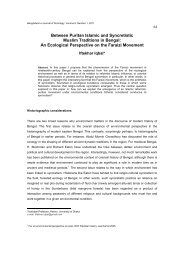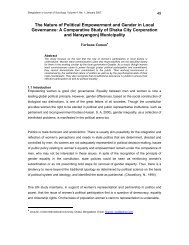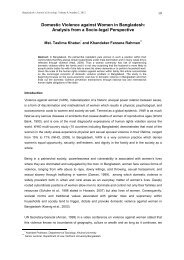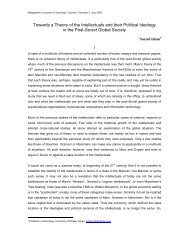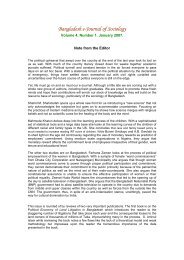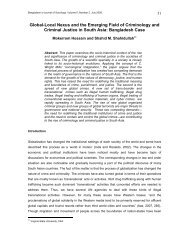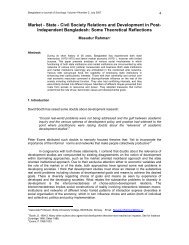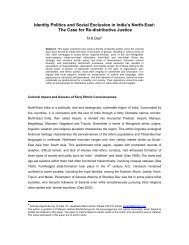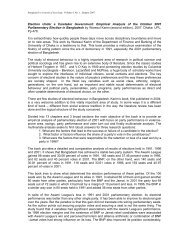Bangladesh e-Journal of Sociology - Bangladeshsociology.org
Bangladesh e-Journal of Sociology - Bangladeshsociology.org
Bangladesh e-Journal of Sociology - Bangladeshsociology.org
You also want an ePaper? Increase the reach of your titles
YUMPU automatically turns print PDFs into web optimized ePapers that Google loves.
<strong>Bangladesh</strong> e-<strong>Journal</strong> <strong>of</strong> <strong>Sociology</strong>. Volume 6, Number 1. 2009.<br />
30<br />
vein, we add that even among men, this belief system varies significantly, and as such, men’s<br />
levels <strong>of</strong> preferring short term partners differ from one to another as well.<br />
As Melrose (2000:1) argues, “‘Patriarchy’ refers to a system <strong>of</strong> male domination, which results in<br />
economic, social and political inequalities between men and women”. This system, thus, creates<br />
privileges for men in general. Following Begany and Milburn (2002), we argue that these<br />
privileges ensure an existence <strong>of</strong> a patriarchal world in men’s minds about their entitlements for<br />
sex and their control on women’s sexuality. For example, while prostitution refers to the market<br />
for men to buy women’s bodies, and as such their sexuality (O’Neil and Berberet 2000), having<br />
multiple female sex partners for heterosexual men is normalized by men’s power in society. This<br />
normalization is reflected in men’s minds about women’s sexuality, and also, because men can<br />
fulfill their sexual needs from multiple outlets, they prefer temporary sexual encounters to<br />
permanent ones.<br />
The notion <strong>of</strong> “power” explicated above is based on what is called “gender privilege” (Johnson<br />
2000; McIntosh 1993), which refers to “unearned” and “conferred” dominance and privileges<br />
(McIntosh 1993). These privileges also confirm men’s feelings <strong>of</strong> entitlements for sex, which are<br />
largely unearned. Thus, following Johnson (2000), we argue that labeling <strong>of</strong> women’s behavior is<br />
a reflection <strong>of</strong> men’s power and dominance. The acceptance <strong>of</strong> rape myths, first introduced by<br />
Burt (1980), is one <strong>of</strong> such labels that construct how women should behave or they should dress<br />
or they should communicate with men. While traditional beliefs and rituals in society validate<br />
cultural standards <strong>of</strong> sexuality (Ayikukuwei et al. 2008), the “prescription”, the term proposed by<br />
Glick and Fiske (1999), for women’s behavior in relation to sexuality also tells how women should<br />
comply with men’s standards, which essentially normalize men’s view <strong>of</strong> women’s sexuality. The<br />
“prescription”, therefore refers to a type <strong>of</strong> “stereotyping” <strong>of</strong> women’s behavior, which is strongly<br />
related to male power (Glick and Fiske 1999).<br />
The above-mentioned stereotyping, we argue, is then reflected in several myths about women<br />
and their sexuality for justifying and legitimizing male power. The acceptance <strong>of</strong> rape myths is<br />
one <strong>of</strong> such stereotyping. This exposes a feeling <strong>of</strong> men about women’s behavior in relation to<br />
sex, and this feeling is learned through extensive socialization process <strong>of</strong> men. This process also<br />
provides men the feeling <strong>of</strong> unearned entitlements for sex.<br />
The above discussion also points to the psychological constructs <strong>of</strong> men about women in general.<br />
Many men believe that the rape <strong>of</strong> a prostitute, for example, cannot be called “rape” (Kurtz et al.<br />
2004; Miller and Schwartz 1995). These men are found to be more likely to believe in “rape<br />
myths”. For example, when women wear provocative dress or they agree to go to someone’s


